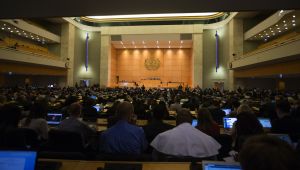As negotiations with Iran over the future of its nuclear program inch toward a possible deal, another intractable Middle East problem with a nuclear dimension is likely to start getting more serious attention. It is the question of whether there is any chance that Israel, Iran, and their Arab neighbors will agree to discuss establishing a regional zone free of all nuclear, biological, and chemical weapons and their delivery systems.
Earlier this month in Vienna, Jaakko Laajava, a Finnish diplomat and the facilitator of the proposed 2012 Middle East WMD-Free Zone Conference, reported to the Non-Proliferation Treaty preparatory committee meeting that although he had conducted more than 100 meetings -- both inside and outside the region -- he had yet to secure an agreement from all relevant states on participation. News of Laajava's no-news statement was met with another round of eye-rolling and finger-pointing: The likely holdouts are Israel and Iran, with a major question mark hanging over Syrian participation.
After decades of backsliding, proliferation, and conflict in the Middle East, the conventional wisdom says the current round of efforts will fail. I think the conventional wisdom is wrong.
In the past, many leaders in the Middle East have seen chemical, biological, or nuclear weapons as an attractive answer to their problems. But this logic is changing. Developments in the region are creating conditions that make progress on arms control and disarmament more possible, not less.
Read the whole article at the Bulletin of the Atomic Scientists
Malin, Martin. “Prospects for a WMD-Free Zone in the Middle East.” Bulletin of the Atomic Scientists, May 28, 2012




